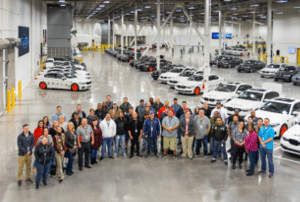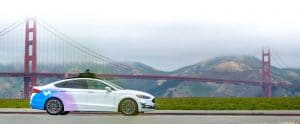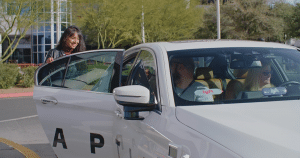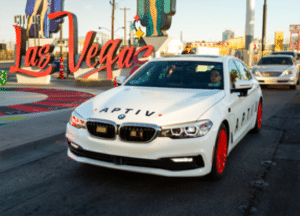It’s become conventional wisdom that driverless vehicles will eventually dominate the nation’s roads. Precisely how soon that will happen is anyone’s guess and, if anything, proponents appear to be backing away from earlier promises that claimed the first autonomous vehicles would by now be in showrooms.
That said, there are now more than 50 autonomous vehicle start-ups based out of Silicon Valley and other parts of the country operating hundreds of prototypes. And Lyft, the nation’s second-largest ride-sharing service, says it has just set a significant milestone, logging the 100,000th ride in one of those prototypes.
While numerous studies suggest Americans have mixed feelings about autonomous vehicles, Lyft claims its experience, to date, has been nothing but positive. “After experiencing self-driving technology, many Lyft riders become advocates,” it said in a new blog post.
(Lyft IPO depends on an autonomous future.)
“When riders experience a self-driving car safely and confidently navigate to their destination, there’s an “aha” moment about how self-driving vehicles really are the future,” the post added. “After their first ride, many riders repeatedly select self-driving mode to bring their friends and family along for the journey.”
Lyft is just one of many companies betting on an autonomous future. The list includes not only key rival Uber but also Waymo, the ride-sharing spinoff of Google, and Cruise AV, the ride-sharing service planned by General Motors and its San Francisco-based Cruise LLC, an autonomous vehicle research company. That’s not surprising. While the pilot ride-sharing programs Lyft, Uber and Waymo now operate still require backup human “operators” who can take over in an emergency, the eventual goal is to eliminate the driver entirely.
That is expected to substantially reduce the cost of using a ride-sharing service, noted the Lyft blog post, which “will empower people to get where they need to go more safely, quickly and affordably than ever before, without having to own a car.”
Each of those four companies is taking a different approach to putting autonomous vehicle technology on the road. Cruise, Waymo and Uber have launched extensive, in-house development programs of their own. Lyft, on the other hand, is focused on a partnership with Aptiv, the Irish-based tech company that was formed by the break-up of automotive mega-supplier Delphi in December 2017.
(Power study finds “total lack of trust” in autonomous vehicle technology.)
That approach, claims the ride-sharing service,”allows Lyft to take care of our riders and help them experience a new type of ride through the Lyft app, while Aptiv stays focused on their area of expertise — self-driving vehicle technology.”
More significantly, said several industry analysts, the approach reduces Lyft’s up-front costs which could otherwise run into the billions of dollars.

Aptiv says it is closely monitoring each ride to both ensure safety and update its hardware and software.
The push towards autonomous and, longer-term, fully driverless vehicles, has not come without problems. Lyft rival Uber found itself in an unpleasant spotlight when, in March 2018, one of its vehicles struck and killed a pedestrian in Mesa, Arizona. Authorities faulted the company for disabling a system that could have prevented the crash while also reporting that the backup operator had been distracted while watching a video, failing to respond until it was too late.
Partly as a result of that incident and other, less serious crashes, there has been a bit of a pullback by many in the world of autonomous vehicles. Gil Pratt, who oversees the development of the technology for Toyota, recently told TheDetroitBureau.com it likely will take longer for autonomous vehicles to become commonplace than many had expected.
Even so, development continues to move forward. This month, the National Highway Traffic Safety Administration approved a waiver request from Silicon Valley-based Nuro that will allow it to begin testing a fully driverless vehicle. If all goes according to plan, the company hopes to have as many as 5,000 of the low-speed delivery vans in operation by 2022.
(Feds give nod to Nuro as 1st driverless vehicle for use on public roads.)
NHTSA is studying requests for additional waivers from, among others, Cruise, Waymo and other ride-sharing services. The agency has not indicated how soon it will respond.



